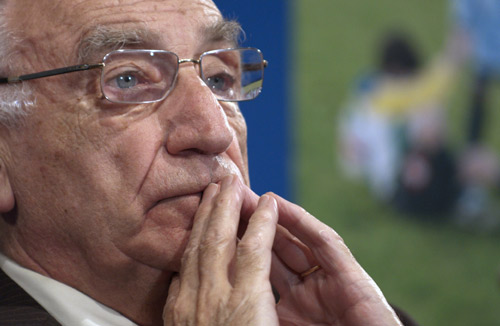PARIS - French Football Federation (FFF) president Jean-Pierre Escalettes said on Monday he was resigning after France's World Cup fiasco.
|
 French Football Federation (FFF) President Jean-Pierre Escalettes attends a news conference to present a bid from France for the Euro 2016 championships, in Paris in this May 19, 2009 file picture. Escalettes said on June 28, 2010 he was resigning after France's group World Cup fiasco. [Photo/Agencies] French Football Federation (FFF) President Jean-Pierre Escalettes attends a news conference to present a bid from France for the Euro 2016 championships, in Paris in this May 19, 2009 file picture. Escalettes said on June 28, 2010 he was resigning after France's group World Cup fiasco. [Photo/Agencies] |
France left the World Cup with one point and one goal from the group stage after the team created a scandal by boycotting a training session in support of striker Nicolas Anelka, who was sent home for insulting coach Raymond Domenech.
"I consider that it is my duty to resign from my role as president of the French Football Federation," Escalettes said in a statement.
"I accept my share of responsibilty", he added. "My decision is essentially dictated by my will to preserve and facilitate the evolution of an institution I have served with passion for several decades."
The 75-year-old Escalettes, who headed the FFF since 2005, said he would officially present his resignation at a council meeting of the ruling body scheduled for Friday.
French Sports Minister Roselyne Bachelot had said last week Escalettes's resignation was "unavoidable".
FIFA had reacted on Saturday by warning French politicians to beware of meddling in the running of soccer amid national soul-searching and high-level meetings over Les Bleus' traumatic campaign.
A former amateur player and English teacher, Escalettes earned praise for solving the FFF's financial problems and heading France's successful bid to host Euro 2016.
The friendly, bespectacled official had faced criticism, however, since his decision to leave Domenech in charge after France's Euro 2008 flop.
The controversial Domenech, whose six-year tenure ended with France's defeat by South Africa in their final Group A game last week, will now be replaced by Laurent Blanc.
"I want to pay tribute to Jean-Pierre Escalettes for addressing the FFF's financial issues, obtaining Euro 2016 and developing soccer in France," French Olympic Committee (CNOSF) president Denis Masseglia told Reuters.
"He certainly wanted the debate to focus on the future of French soccer and not on whether he should resign or not," Masseglia added.
Escalettes, whose current mandate was to expire in 2012, had faced sustained pressure since France's struggle to qualify for the World Cup, which culminated with a playoff win over Ireland featuring Thierry Henry's infamous handball.
France's worries worsened in South Africa, with dismal displays on the pitch and plenty of drama off it.
The boycott of a public training session in Knysna, Western Cape, came after the FFF decided to kick Anelka out of the squad for crudely insulting Domenech at halftime of a 2-0 defeat by Mexico.
There was more controversy after France's defeat by the hosts when Domenech refused to shake hands with Bafana Bafana coach Carlos Alberto Parreira, whom he accused of having said France did not deserve to be at the World Cup.
The former world and European champions finished bottom of one of the easiest groups in the tournament with one draw and two defeats.
Such was the national angst in France that President Nicolas Sarkozy urged a soccer shakeup and met former team captain Thierry Henry.
Bachelot, who was dispatched in South Africa to address the warring parties and try to galvanise wobbly troops before France's final group game, then slammed "immature gang leaders" in the camp.
Escalettes had kept silent since saying after the defeat by South Africa that he would not resign "because it was not in (his) nature to abandon a sinking ship."
Sarkozy has called for a wholesale review of French soccer after the outcry caused by France's disastrous World Cup showing.

